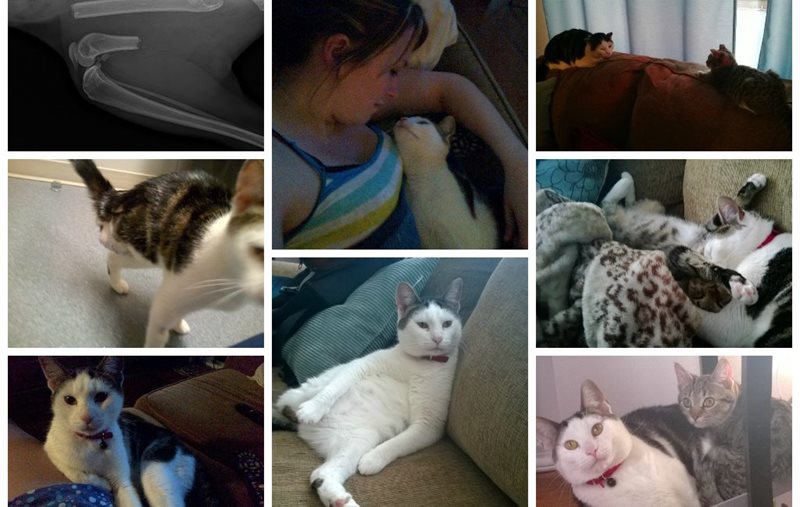At first thought, when a veterinarian recommends or suggests the option of amputation for your pet, it might sound pretty scary. A million and one things will be going through your mind. How do I feel about having a 3-legged animal? How will my pet cope with losing a limb? Will they be in pain? Is it worth all the trouble? I’m here to tell you that: Hey! It’s really not as bad as you think. This subject is one I know firsthand with my 3-legged kitty, Selina.
I still remember the night I was working, and this poor cat with a fractured femur came in to our hospital. She was about two years old and was surrendered to the local SPCA by her previous owners who just did not have the funding required to be able to help her and selflessly made the decision to surrender her. The SPCA gave her a second chance instead of opting for euthanasia. There were now two options; to repair the fracture with pins or a plate, or to amputate the back leg.
Between the clinic and the SPCA, the decision was made to amputate her back leg. That week, we performed the surgery and everything went smoothly. She was kept on some pain and anti-inflammatory medication and was recovering quite rapidly. The plan was for her to recover for 2-3 weeks and then she would be moving to the SPCA to find a new home. At the time, I was doing a lot of night shifts and found myself playing and cuddling with her whenever I got a chance to sit down for a break. It didn’t take very long, and I was attached! Her personality won me over and I just found it remarkable how she didn’t even seem to mind missing a 4th limb. She was getting around just fine, just as if she was born this way.
The following week, the adoption process was all done and she was ready to come home. For the first month or two, we had to alter her environment a little; shorter litter box to step into, little stairs going up the couch… She was hopping along just fine, just needed to build up her muscles to be able to jump with one back leg. Soon enough, she could jump up the couch and the bed with ease, and she could now do practically anything that a normal kitty could. Almost a year later, we adopted a kitten and introduced them. Let’s just say she was less than pleased with my surprise, she’d always been quite independent and was not liking the idea of sharing. Now almost another year has passed since then, they’ve grown to be great friends and you can’t usually find one without the other being too far away.
There are multiple reasons why a pet might require or be suggested to get an amputation such as; a malignant cancer in a bone or tissue of a limb, severe trauma, paralysis… The risk of complications is low, but can be quite serious and require to be seen by a vet if they do appear. Complications can vary from bleeding post operatively, to an infection or a wound breakdown over the surgery site.
Pets surprisingly do very well with 3 legs and unlike humans, have minimal psychological effects and don’t really need to cope with the loss of a limb. As long as they can run, jump and play, they’re generally pretty happy creatures. There is though something called “phantom limb pain” that is known to happen sometimes with cats and dogs. Phantom pain is caused by tissue, nerves and/or muscles being injured, resulting in chronic pain. It’s as if the pet can still feel pain in a limb that is no longer there. Symptoms of this include twitching of the skin, chewing the affected area, vocalizing, urinating and defecating inappropriately, loss of appetite. Phantom pain is usually diagnosed by ruling out any other reason for pain. This does not necessarily happen to every animal amputee, but if it does, symptoms might appear to be worse in some animals than others. You should talk to your veterinarian if you see some of the above symptoms; some medications have been proven affective against this type of neurologic pain and can be worth a try if it means comfort for your pet.
Your veterinarian will make sure that your pet is not in any pain, it is a priority that every pet in the clinic be comfortable and as stress free as possible. Your veterinarian might even prescribe pain and anti-inflammatory medication to go home with your pet if needed.
I would love to say that if ever you’re in a situation that your only options are amputation or euthanasia to pick amputation, but that’s not a decision that anyone can make for you. Unfortunately it can be a tough decision and is not always black and white. You need to realize that your pet might need some time to recover and strengthen muscles to compensate for the loss so that will require some exercise and possibly some rearranging around the house to make it easier to move around. Patience and understanding will be important; they might not make it outside on time and occasionally have an accident on your kitchen floor. Does your animal tend to become overweight? With more weight to bare on the other legs, you’ll have to make sure your pet doesn’t gain much weight as this could result in painful arthritis in the future. So many things need to be taken into consideration. Every pet is different, but if you, as a pet owner, have the dedication, patience and understanding needed, your pet will truly surprise you with how well they’ll do.

by Jenna B.